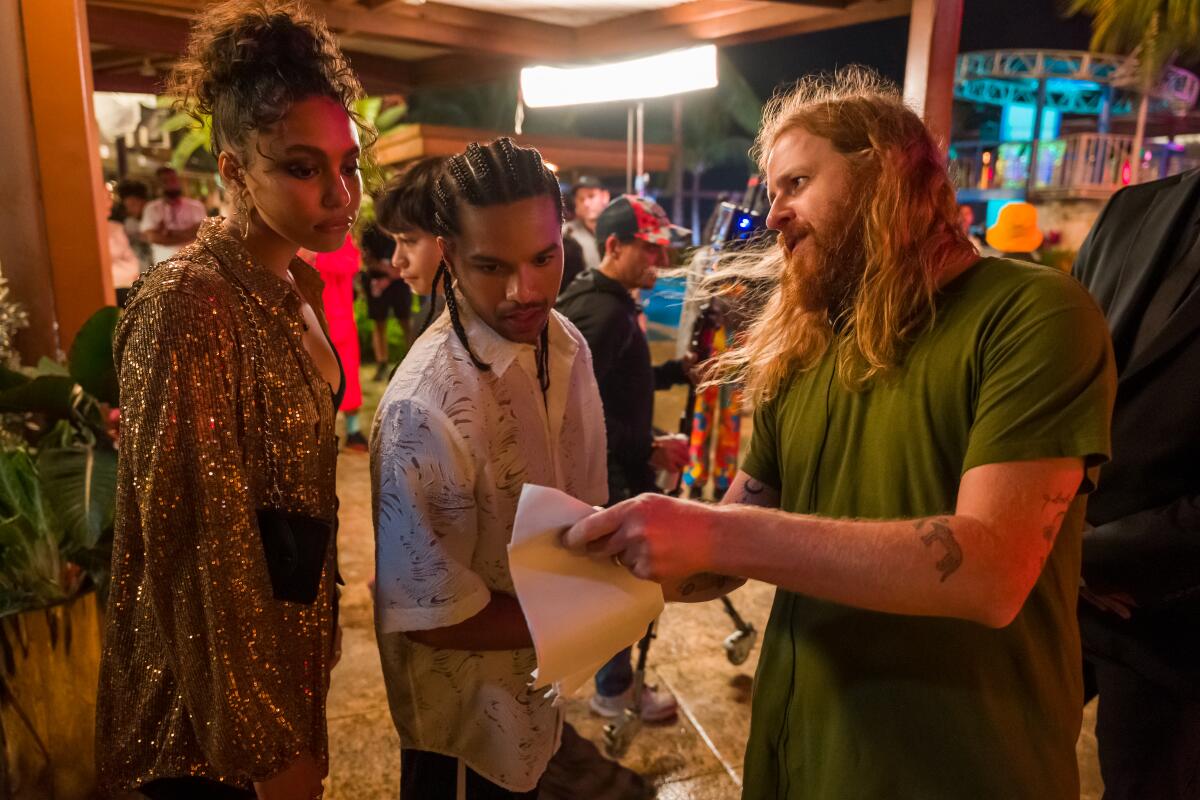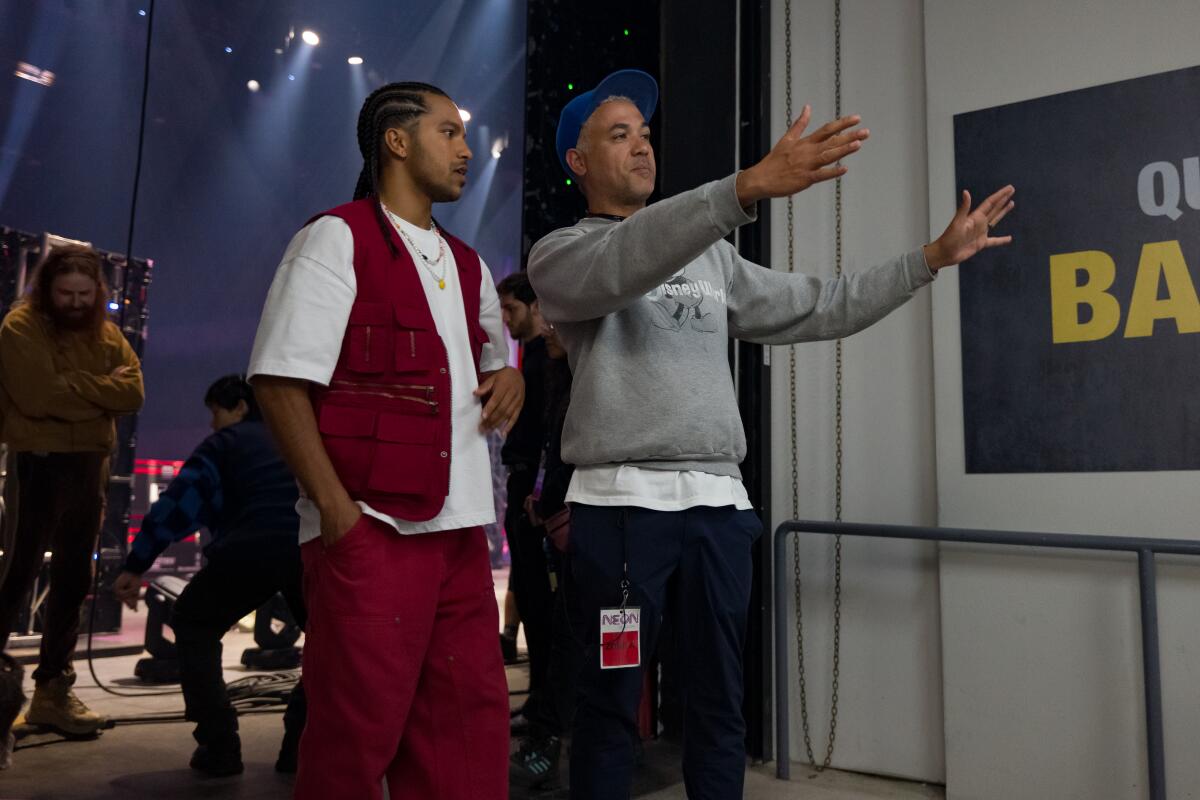When showrunner Max Searle began working on “Neon,” he wondered whether he could get the “King of Reggaeton” involved in his new Netflix series about Miami’s music scene.
“When we started out, we always thought, ‘Oh, wow, it’d be really great to have Daddy Yankee as the executive producer of this show.’ Well, that’s probably not going to happen, but maybe we can get someone else,” Searle says. “Having him essentially bless the show or feel compelled to be a part of it would really mean a lot to everyone who worked on it.”
To Searle’s surprise, Daddy Yankee not only signed on to “Neon” as an executive producer but he also agreed to make a few cameo appearances in the series’ first season, which premieres Thursday. The show follows a rising reggaeton star named Santi (Tyler Dean Flores) as he and his friends — Ness (Emma Ferreira), who acts as his manager, and Felix (Jordan Mendoza), his creative director — make the move from Ft. Myers, Fla., to jump into Miami’s bustling music scene. They’ll need luck and a little help from music biz insiders like Mia (Courtney Taylor) to make their starry-eyed dreams a reality.
In addition to Daddy Yankee, other reggaetoneros like Jhayco (also known as Jhay Cortez) and Brray also make appearances, and legendary producer Tainy oversaw the show’s music, making “Neon” feel like a part of the community and a sound that now travels far beyond Miami and Puerto Rico.
In a call with The Times, Searle and director Oz Rodríguez, who helmed the first episode, shared their excitement about the series, how the elements of “Neon” came together, note by note, and the importance of hitting an authentic tone. This interview has been edited for length and clarity.
Felix (Jordan Mendoza, left), Ness (Emma Ferreira) and Santi (Tyler Dean Flores) are best friends who move to Miami in hopes of making it in the music business.
(Netflix )
To my knowledge, there has not been another U.S. show set in Miami’s reggaeton scene. What moved you to make “Neon” now?
Max Searle: The reggaeton space is just becoming more and more popular every day. I think it was something that feels long overdue, something that people are clamoring for. [Netflix] had been talking with Shea Serrano and SB Projects [the media company founded by music executive Scooter Braun], who I had worked with on my previous show, “Dave,” which is also in the music space. They came to Shea and said, “Hey, we want to do this thing. Do you have anything?” Shea came up with the idea, and it was sort of off and running from there. I got brought in through SB to show-run with Shea. Miami felt right, in terms of this is an exciting place that a young person would come to with wide eyes and be overwhelmed by but also enamored with. That’s where the title came from.
The series follows three lifelong friends trying to make their music industry dreams come true. How did you find the right actors for the cast?
Oz Rodríguez: We wanted to do a chemistry read just to see how these guys work together. We’re still recovering from COVID, so a lot of casting is on Zoom and self-tapes. The whole show is built on that foundation of friendship between those three, and then later, Courtney joins [as Mia]. We needed to see these guys: What do they look like in real life? What are they like? How are they in a room? I came in, and we shot a chemistry read in the Netflix building. We did some scenes from the pilot. Even in that chemistry read — which there’s just a white room and they’re sitting in a chair, pretending like they’re driving — you could tell there was something there between Taylor, Emma and Jordan. It also helped that I brought a little speaker, and I put on some Bad Bunny and they just started singing. It was just like there was an inherent sort of fun, and I could buy these guys being really good friends.
Searle: I also want to add to that — Oz had the brilliant idea that the night before, he took them all out to dinner, and they hung out. I think that really eased everyone into a place of feeling comfortable and at ease with the characters.

Emma Ferreira and Tyler Dean Flores, center, on the set of “Neon” with Max Searle, the co-creator and showrunner of the Netflix series.
(Francisco Roman / Netflix)
Speaking of Bad Bunny, whose music can be heard in the show, reggaeton is woven throughout the fabric of the series. How did you select which songs to include in the first season?
Rodríguez: In my episode [Episode 1], it was a group effort. I threw in a suggestion. Tainy and Tyler would just always throw in something. We were surrounded by really amazing people with amazing taste, like Daddy Yankee. Everybody was pitching ideas.
Searle: For sure, and we have these two amazing consultants, Suzy [Exposito, a columnist at The Times,] and Gata [Katelina Eccleston of Reggaeton Con La Gata, a platform focused on the genre’s history], who were just invaluable in terms of steering us in the right direction, making sure we were covering all aspects of the genre — being true and authentic to the history of the genre, and where it’s going and where it is today. Having them as the North Star to always go back to and say, “We’re looking for some more [music] like this,” and they would chime in. We had those two on board from the beginning, and it was just such a blessing to be able to listen to them and soak up knowledge.
Rodríguez: I would also add that I think it reflects Miami and the Caribbean diaspora as far as there is always music playing everywhere you go. It’s just the soundtrack to everyday life. That’s something we wanted to reflect on the show, just the constant beat of things.
There’s a fair amount of hidden Miami jokes, and yes, the accent. How did you incorporate that sense of place into the show even though it was filmed in Puerto Rico?
Searle: We had some writers that were from Miami, Susie’s also from Miami, and we had a lot of Miami consultant help. There’s probably brighter images of Miami onscreen, but we wanted to shine a light on other parts of Miami. The apartment they live in is by no means glamorous, but that is a big part of South Florida. A lot of the things we heard, especially from one of our writers who lived in Miami, was “I never see the Miami I lived in.” That was important to us from the beginning to show people the actual other side of the coin, that this is the reality of living in Miami.
Rodríguez: I gotta give a shout-out to our cinematographer Diana Matos, who lives in Miami and would call BS if a shot didn’t feel like Miami. She’d say, “No, no, this isn’t it. We gotta keep looking.”

Tyler Dean Flores, left, and director Oz Rodríguez on the set of “Neon.”
(Francisco Roman / Netflix)
Reggaeton royalty Daddy Yankee plays a role off- and on-camera for “Neon.” How did he join the project?
Searle: We were lucky enough to get in front of him and talk to him. Oz and I and a bunch of other people were in on the first meeting with him. We’re all very nervous, and he just shared his excitement about the script he read and the other stuff we’d sent him. It felt authentic to him and things he’d experienced, and that was really gratifying. He said, “Yeah, I want to be a part of this.” It just felt so great to know that someone like him is going, “Yep, this works for me. This is how it is.”
Rodríguez: He also looks amazing on Zoom. Like, the best looking person I’ve ever seen on Zoom. I’m still embarrassed about how much I fanned out on that first Zoom that we had because I’m from the Dominican Republic — I’ve been hearing [Daddy Yankee] my whole life — and I can’t believe you said yes. I gave him his flowers for five minutes straight.
What other reggaetoneros can fans expect to see in the series?
Rodríguez: There’s Daddy Yankee, of course, but also Jhay Cortez, and just in my episode, we have Jon Z and Brray, but also Villano Antillano and Jowell as well. [Brray] did a lot of improv, like when he introduces himself and rattles on all those names. That was his idea. He was like, “Hey, is it cool if I say all this?” Like yes, do all that.
Did you craft certain scenes for special guests?
Searle: Yeah, those were early scenes that we crafted that felt like [they] would resonate with people, like meeting your heroes. Something I learned on “Dave” is you have to be flexible with who you’re going to get, how you’re going to get them, and when their hours are going to be. OK, we might have to shoot this person tomorrow. Let’s have this ready to go. Then they might say, “Actually, I’m not coming tomorrow, I’m coming next week.” There was a lot of moving around but we managed to work it into everyone’s schedule.
It’s always a challenge to make music inside a movie or TV show that’s genuinely good. How did you create Santi’s sound?
Searle: We said early on it would be so cool if we could get Daddy Yankee as the executive producer and Tainy to do the music. Well, that’s probably not gonna happen. And somehow we got both of them. He is the hitmaker, and like you said, you’re not going to buy it as an audience if it’s a song that’s just pretty good. No amount of writing or acting or anything can sell a star if we don’t have that behind him. Tainy and his whole team were just so amazing and with their time — talking to us about what they wanted to do, and us tossing in things that we were hoping to get out of it.
Oz, what was it like reuniting with Shea Serrano and Tyler Dean Flores for this new series?
Rodríguez: It kind of happened as we were doing “Miguel Wants to Fight.” That’s when Tyler started auditioning and when I first heard of the project. It’s really fun to work with people you’ve collaborated with before because you established the shorthand. Truthfully, I don’t get to work with a lot of talented Latinos, or Latinos in general. It’s incredible to do another big project like this for Netflix and to globally release a story that is very much a Latino story.
This story originally appeared on LA Times

